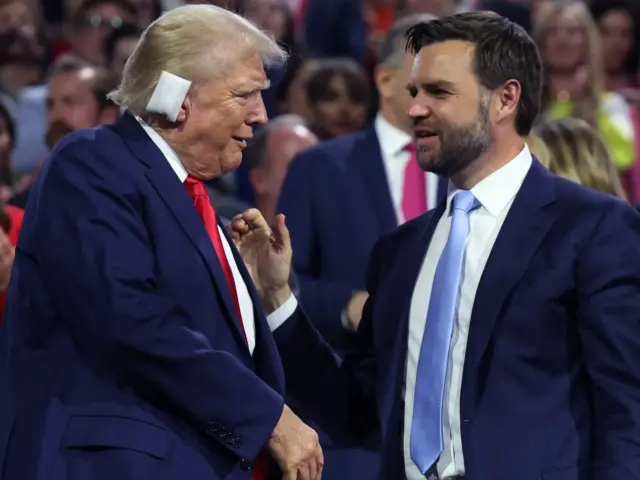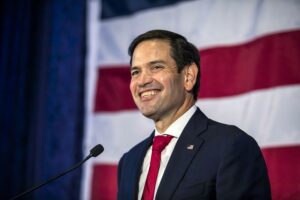Trump’s VP Pick Potential Loss for India

Sid Atanya <Calcutta>
While he may have a Hindu wife of Indian origin, the choice of JD Vance as Donald J. Trump’s vice-presidential nominee may not be the best choice for India’s interests.
Little is known of Vance’s international views but his firm anti-immigration stance may mean that a potential new Trump-Vance administration could restrict immigration from the subcontinent.
Actually, there seems little to be gained on the other side, either as Kamala Harris identifies more as black than Indian. Moreover, neither Harris nor Usha Chilukuri Vance, Trump’s vice-presidential nominee’s wife, have rarely visited the birthplace of one or both of their parents, even though Indian pride in their ascent in American politics is well on display.
Trump was considering Senator Marco Rubio to be his vice-presidential nominee, and had he picked the Latino politician, who, himself, had previously run for president, the choice may have profoundly deepened US-India ties.
Although Harris has no substantive ties to India and Chilikuri Vance, according to a recent Washington Post article, seems to have little influence on her husband’s politics, Rubio has demonstrated through action, that he is in support of far greater Indo-US defence cooperation.
According to Rubio’s website, he has not only proposed putting the US-India defence relationship on par with other frontline allies like those of NATO, he goes further in talking about potential threats in the region. The website reads:
The U.S.-India partnership is vital to countering influences from Communist China. In order to strengthen this partnership, it is essential to enhance our strategic diplomatic, economic, and military relationship with New Delhi.
U.S. Senator Marco Rubio (R-FL) introduced the U.S.-India Defense Cooperation Act to expand bilateral cooperation as India faces increased aggression from Beijing.
-
- “Communist China continues to aggressively expand its domain in the Indo-Pacific region, all while it seeks to impede the sovereignty and autonomy of our regional partners. It’s crucial for the U.S. to continue its support in countering these malicious tactics. India, along with other nations in the region, is not alone.” – Senator Rubio
Specifically, this legislation would:
-
- Set a Statement of Policy that the U.S. will support India in its response to growing threats to its territorial integrity, provide necessary security assistance to India to deter adversaries, and cooperate with India with respect to defense, civil space, technology, medicine, and economic investments;
- Provide a limited exemption for India from CAATSA sanctions for purchases of Russian equipment that are currently used by the Indian military;
- Set a Sense of Congress that expeditious consideration of certifications of letters of offer to sell defense articles, defense services, design and construction services, and major defense equipment to India is consistent with U.S. interests and it is in the interest of peace and stability India to have the capabilities needed to deter threats;
- Treat India as if it were of the same status as U.S. allies such as Japan, Israel, Korea, and NATO allies regarding technology transfers;
- Authorize the Secretary of State to enter into a memorandum of understanding with India to increase military cooperation;
- Expedite excess defense articles to India for two years and grant India the same status as other allies;
- Expand International Military Education and Training Cooperation with New Delhi;
- Require a report to Congress on Pakistan’s use of offensive force, including through terrorism and proxy groups, against India; and
- Bar Pakistan from receiving security assistance if it is found to have sponsored terrorism against India.
The bill has yet to reach the Senate floor for a vote, and one wonders if the once Pakistan-influenced Joe Biden would veto the bill before the new president is sworn in in January, 2025.
However, had Rubio been chosen rather than Vance, its support at the executive level would have been assured. At present, while proposal of the bill is a positive sign, and Rubio will surely be canvassing support for it in the Senate where few can doubt the growing shadow China poses as a security threat, there is no assurance that it will be passed. Historically, Democrats have shown a tendency to placate China, and the current President is no exception. This is only amplified by his historical closeness with Pakistan.
Biden is one of only two US politicians to have been awarded Pakistan’s highest civilian honour as a reward for advocating for Pakistani interests during his career in the Senate and as Vice President. The ground realities in Asia have prevented him from following suit as president, though he did essentially hand over Afghanistan to the Taliban who were spawned and cultivated by Pakistan and serve their interests. Perhaps, too, the current president is no longer in charge of his administration.
 The Global Calcuttan Magazine
The Global Calcuttan Magazine 